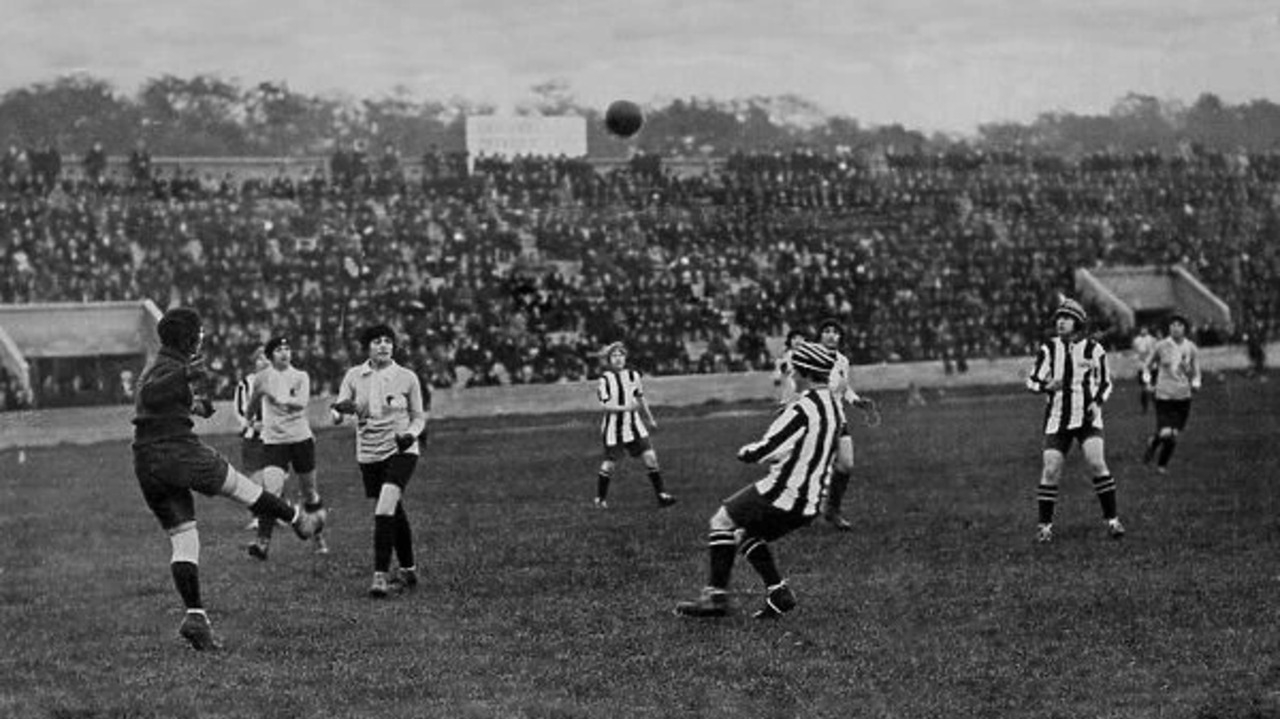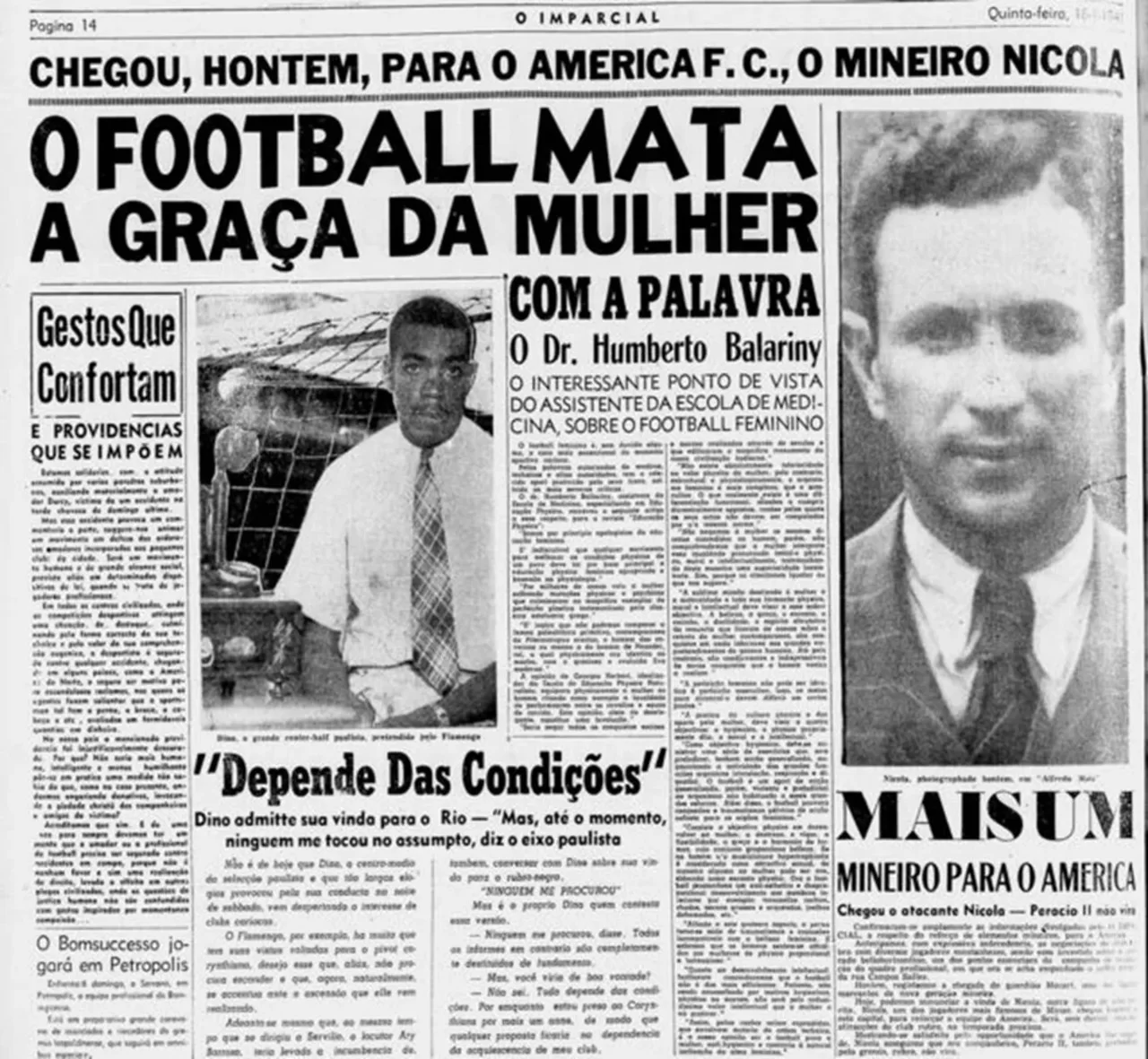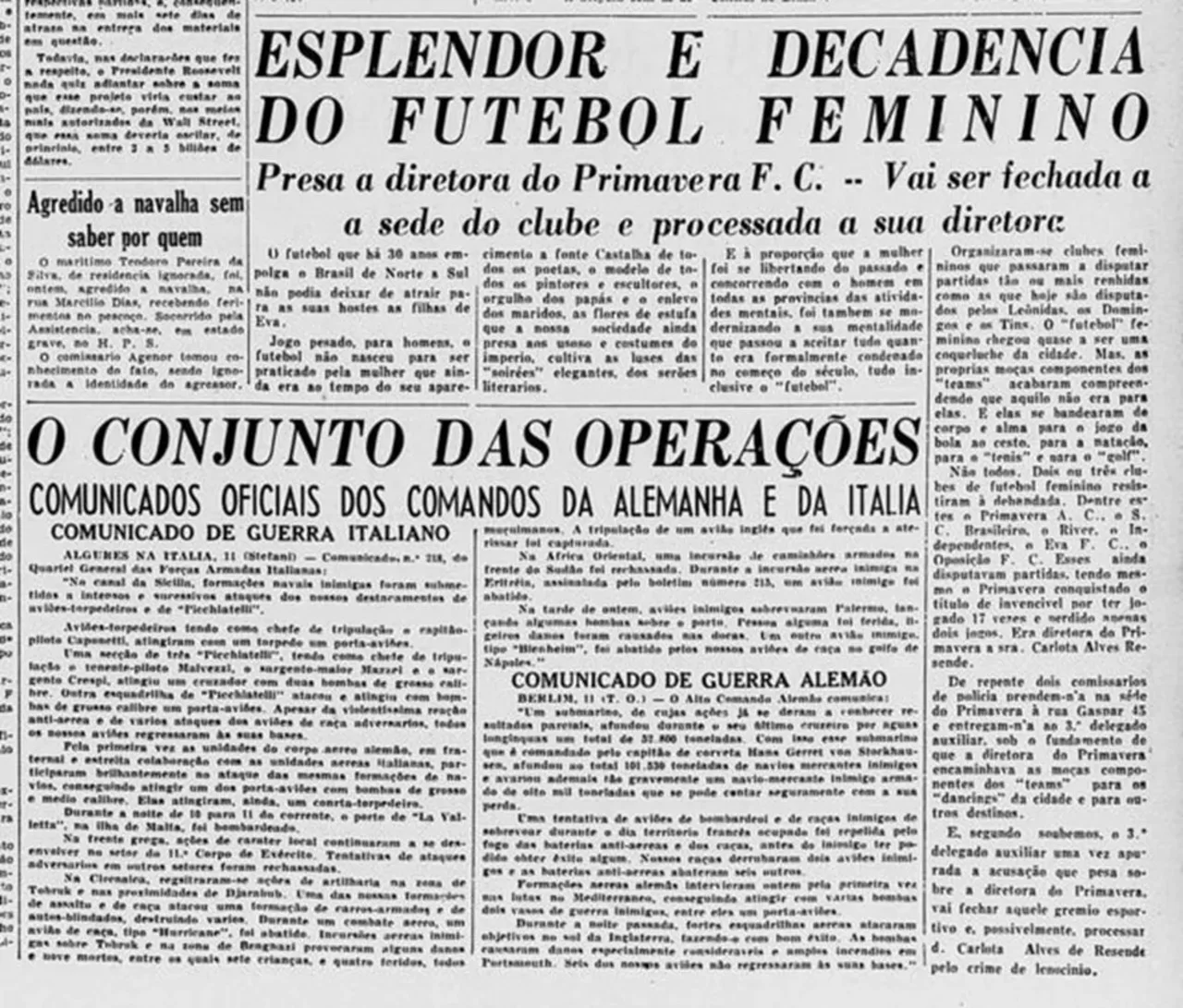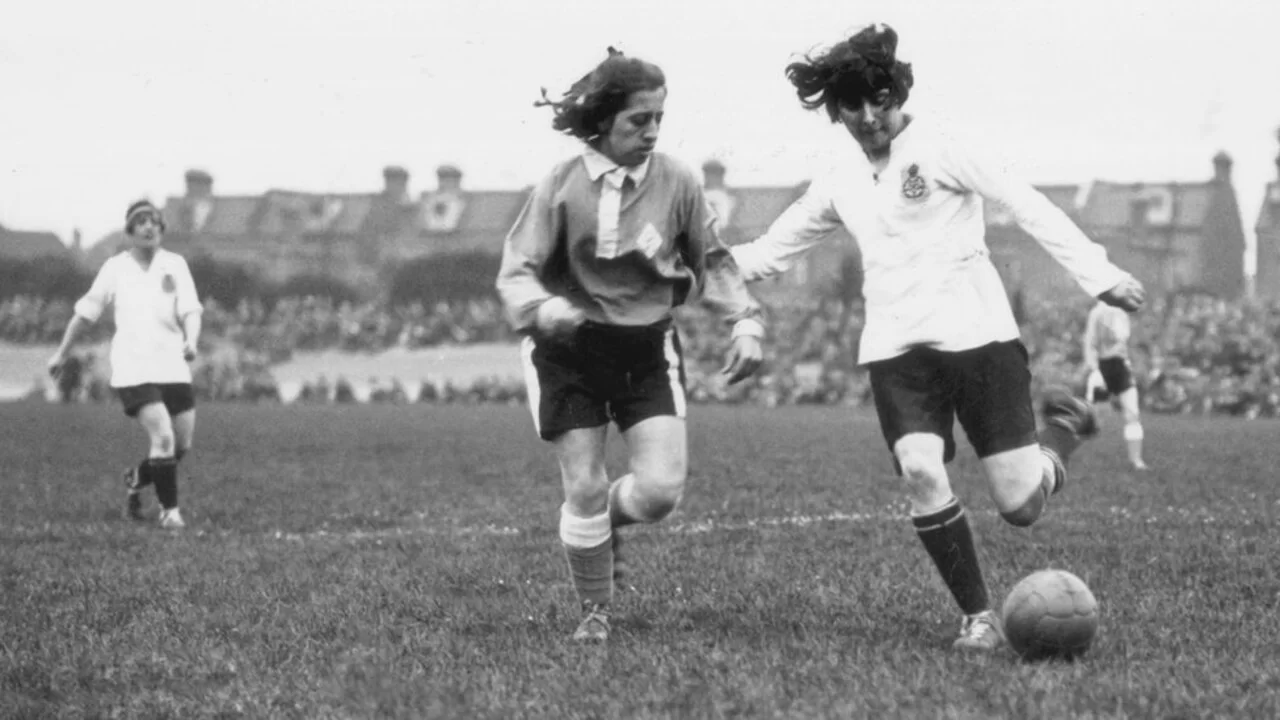
the struggle of women’s football in Brazil and in the world
Follow Us @
the struggle of women’s football in Brazil and in the world
Men’s football grew in the spotlight in the country during the 40’s and, would meet its king, Pelé, in the following. Women’s football, in the same period, expanded and showed its faces in the face of male predominance in this sport. However, due to the prejudices of the time, this modality was restricted to women for 44 years.
Other countries such as Paraguay, France, United Kingdom, Germany and Belgium also adopted this practice, however, Brazil is the one that stands out the most in restricting this modality to women. Understand next.
Decree 3199 and the declaration of the end of women’s football
Brazil stood out in the history of women’s football negatively, applying during the Getúlio Vargas regime, in 1941, decree 3199 that prohibited women from acting for sports organizations and also from practicing this sport on the streets or wherever.
“Women shall not be allowed to practice sports incompatible with the conditions of their nature”was what decree 3,199 said.
By the way, it wasn’t just football that was extinct for women, but also any firmer sport, like fights, for example.
And although there was decree, there was no established punishment. Each police station imposed the sanction it deemed necessary. Therefore, most cases ended in women being arrested, but they only gave statements and were soon released.
According to historian Aira Bonfim, specializing in women’s football, the resistance of society at the time motivated the ban. Furthermore, another fact that impacted society was the match held at the newly opened Pacaembu, in May 1940, between two clubs in the suburbs of Rio de Janeiro, Casino de Realengo and Sport Club Brasileiro, where both teams were composed of women.
In addition to controversy, it caused the division of public opinion and the press. Even without having a majority opinion, an idea was still consolidated: men and women should play specific roles.

Article in the newspaper ‘O Imparcial’ in 1941 about women’s football. (Highlight photo: Reproduction/AcervoDaFundaçãoBibliotecaNacionalBrasil/G1)
The repercussion of this match was so great that it reached President Vargas, through a letter, from a Rio de Janeiro citizen named José Fuzeira, where he was decisive for the veto of this decree. This letter contained information which it said could “seriously affect the psychological balance of bodily functions”.
Bonfim also told BBC Brasil that the concern, in fact, was not about the female reproductive capacity or health, but to confirm the existing prejudice at the time, since many of the players came from the lowest class in society.
“They were still often associated with social disruption, as if they were prostitutes or did things that couldn’t be said in those environments.”says the historian to BBC Brasil.
In addition to historian Aira Bonfim, historian Brenda Elsey, professor at Hofstra University and author of the book Futbolera: A History of Women and Sports in Latin Americaalso agrees that this was not the real concern since:
“In the 1940s, it was already well known that sport was not harmful. In fact, there was a whole school in Rio de Janeiro carrying out research on how physical activity benefits maternal health”says and adds: “it was nothing more than a tactic to limit women’s freedom, their free time activities and their ability to express themselves, as well as a huge demonstration of homophobia.”
This decree lasted for 38 years, until its repeal in 1979. However, its proper regulation only took place in 1983. However, in this period of three decades, women did not stop. They dressed like men, played at night or in private spaces. And when they were approached by police, they would run in opposite directions to make their work difficult.

Article from 1941 in the newspaper ‘A Batalha’ about the arrest of the director of a women’s soccer team. (Highlight photo: Reproduction/AcervoDaFundaçãoBibliotecaNacionalBrasil/G1)
However, as much as they still managed to play soccer, the Brazilian women’s modality was greatly harmed, says Júlia Barreira, professor of the Physical Education course at Unicamp, because in that period there was no development in women’s soccer.
“The girls and women defied the decree, occupied the floodplain fields and organized themselves in peripheral spaces to continue practicing the modality, but they completely lost the competitions and sports organizations that supported them”, he says, according to the G1.
She also highlighted the difference in achievements between the men’s and women’s teams, where the men’s team won the World Cup 5 times and the Brazilian women’s team won only one runner-up in 2007.
“We spent almost four decades without official competitions for them to practice and develop, structure to support them or training of coaches with qualification to work specifically with this group.”
UK
In the United Kingdom, the popularity of football was rising, conquering more and more audiences, but with the arrival of the First World War, everything changed. The English Championship had to be suspended and, thus, women had to fill in the gaps left, as in factories, which they already worked due to the lack of men available for work. Allied to this, football was a great way to keep women healthy and strong for factory work.
At first, the factories only organized tournaments for charity purposes, however, the popularity grew so much that there was even a tour of the Dick, Kerr’s Ladies team, one of the best teams in women’s football at the time. By the way, some matches of the British team attracted more than 50 thousand spectators in their stands. Including Lily Parr, one of England’s greatest goalscorers, was part of that team.

Dick, Kerr Ladies (in white) playing in an international match. (Featured photo: Reproduction/GettyImages/BBC)
From this growth, even more so for the time, the English Football Association (FA) feared that this would disrupt men’s football, so, on December 5, 1921, it assigned the following restriction: any woman was prohibited from playing on the fields of football associated with the FA.
The official version justifying these actions was the same as the Brazilian one: danger of infertility and health. And, with that rule in place, many women’s teams lost strength and could no longer sustain themselves, ending most clubs.
This ban was only withdrawn almost 50 years later after pressure from FIFA (International Football Federation) on the FA. In the aftermath, the Women’s Football Association (WFA) was formed.
Europe and Paraguay
After England vetoed women’s football in the country practically, part of Europe also decided to join the same path. In West Germany, this sport was banned for women between 1955 and 1970. Even if the German Football Association used the same explanation, the “aggressive sport” was unusual “to the nature of women”.
French women’s football, on the other hand, had a strong impact when it shared territory with Germany itself, during the Vichy government, which was divided between 1940 and 1944, adopting a ban on the practice of this sport for women until the French Football Federation officially recognized women’s football in March 1970.
In Belgium, the ban was as far away as in Brazil. It lasted practically 50 years, from 1920 to 1970, and the ban was only revoked after pressure from the players on top of the Royal Belgian Football Association.
And, in addition to Brazil, Paraguay was also another South American country to adhere to this restriction according to records. It was decreed in 1960 that women could not play football, with the same premise going against “woman’s nature” and that it could affect their fertility.
Featured photo: Team Dick, Kerr’s Ladies in a 1922 photo. Reproduction/MemoryLane
the struggle of women’s football in Brazil and in the world
Follow AFRILATEST on Google News and receive alerts for the main news about celebrities, soap operas, series, entertainment and more!
SHARE POST AND EARN REWARDS:
Join our Audience reward campaign and make money reading articles, shares, likes and comment >> Join reward Program
FIRST TIME REACTIONS:
Be the first to leave us a comment, down the comment section. click allow to follow this topic and get firsthand daily updates.
JOIN US ON OUR SOCIAL MEDIA: << FACEBOOK >> | << WHATSAPP >> | << TELEGRAM >> | << TWITTER >
#struggle #womens #football #Brazil #world
-

 Fashion3 months ago
Fashion3 months agoVogue Arabia cover welcomes Salma Hayek in an interview with Penélope Cruz
-

 Football3 months ago
Football3 months agoVAR points out Diego Costa's offense against the fourth referee
-

 USA today entertainment3 months ago
USA today entertainment3 months agoBeyonce with the single “Break My Soul” leads on Spotify Brazil
-

 Health and Fitness3 months ago
Health and Fitness3 months agoVaccine against the reappearance of skin cancer enters final testing phase
-

 USA today entertainment3 months ago
USA today entertainment3 months agoSZA, Future and DJ Khaled come together in collaboration
-

 News3 months ago
News3 months agoParents of former player Waleswska are pressured by widower to pay rent for the house where they live
-

 USA today entertainment3 months ago
USA today entertainment3 months agoLarissa Luz and Linn da Quebrada enchant at the Multishow Awards with a tribute to Elza Soares.
-

 Good News TV series3 months ago
Good News TV series3 months agoThe shocking reason behind the decision not to show dead characters in The Last Of Us episode revealed












































